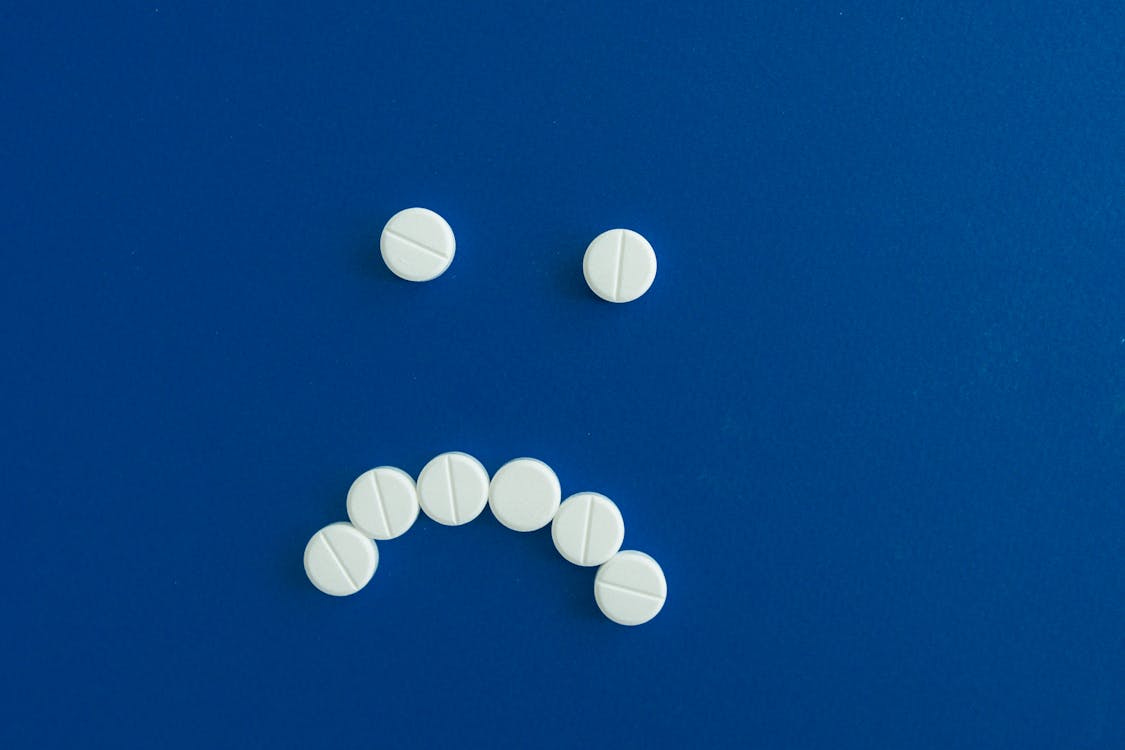Good grief, Moncrieff: How mainstream media keeps letting down the vulnerable
A notorious campaigner protesting against antidepressants can apparently expect access to the most high-profile platforms. But why does this keep happening?

I didn’t want to write this. I’d already written a post for today. I only published it a few hours ago! I have other things to do, you know?
But then, someone alerted me on BlueSky that The Today Programme, BBC Radio 4s flagship news and current affairs programme, was airing a long interview with Joanna Moncrieff, in which she repeatedly emphasised that antidepressants are no better than placebos. Which is medical speak for “they don’t do anything useful”.
No doubt many people who heard this interview will have been affected by it. Maybe they now think they should avoid antidepressants because they’re no use. Or actively harmful. If they’re already on antidepressants, they may now be thinking they should abandon them, for the same reasons.
Others will now be more dismissive or critical of others who do rely on antidepressants, furthering stigma and stress for those who already deal with far too much of that sort of thing already.
I’m not being hyperbolic here, just to be clear. This isn’t speculation or straw-manning. This is exactly what happened when Johann Hari did basically this exact thing, and I ended up being the figurehead of the backlash, for some weird reason1. And now it’s happening again.
This time, though, it’s not a journalist and renowned plagiarist making these claims about antidepressants, but an actual expert psychiatrist. Surely that’s much more significant?
Possibly. Hopefully Moncrieff’s aptitude for shameless self-promotion falls short of Hari’s (which isn’t exactly an achievement) so the impact she has may be less widespread. But who knows?
There are, however, many reasons to be sceptical of Moncrieff’s claims.

True, Moncrieff is a qualified psychiatrist. But that’s not as significant as you may thing. And it’s weird how this blog is barely a month old, yet this is my second time critiquing the alarmist claims of a professional psychiatrist in the mainstream. Check out my previous post about this, most of the arguments still stand up.
Moncrieff has made herself a go-to ‘expert’ for anyone questioning the validity of antidepressants, and no doubt her qualifications help a great deal here.
Credit where it’s due, Moncrieff does do her own research. But that research has been heavily criticised by many others in the field.
I’m also not saying Moncrieff hasn’t helped a great many people in her career, and may honestly believe she’s doing so now.
But… I spent many years working in psychiatry, and there is a certain tendency for the ‘God complex’ to develop, a phenomenon that has been flagged up for decades. I’ve been part of many discussions about how sorely-needed improvements to emergency mental health services are often scuppered by the fact that they involve a psychiatrist possibly losing ultimate control over what happens to a patient.
Maybe this is inevitable when you take a highly-qualified person in a very demanding field, and give them the ultimate say over pretty much life-and-death matters, for countless vulnerable individuals whose self worth and/or grasp on reality is likely not the best. Such people may begin trusting their own conclusions beyond reasonable limits.
I’m not saying that’s definitely happened with Moncrieff, but when your claims are powerfully amplified by the right-wing media ecosystem and you start publicly questioning vaccines, it’s hard not to think that maybe someone’s gone a little off the deep end, with regards to evidence and reason.

She’s written a book and got it published! But anyone can do that (believe me)
Presumably the reason Moncrieff was on Radio 4 today was to promote her new book, which was published less than a week ago.
Surely is somebody wrote a whole book about an issue and got it published, there must be something to it?
Take it from somebody who works in publishing… no, there doesn’t. See the earlier example of Johann Hari’s book. Much as I love it and have many friends and colleagues I admire within it, publishing isn’t an industry stocked with expert scientists, let alone ones given sufficient authority to reject any books that fail to meet standards for evidence-based claims2.
And while I’ve not read Moncrieff’s book (I only heard it existed this morning), I already have reasons to be sceptical.
Mainly, the title. “Chemically Imbalanced: The Making and Unmaking of the Serotonin Myth”. If you’ve been paying attention to the psychiatric or mental health literature, you’ll know that the ‘chemical imbalance’ model of depression3 has long been deemed obsolete. So much so, that some psychiatrists insist (wrongly) that it was never a thing at all.
But the chemical imbalance notion remains common and widespread in the wider population.
I’m not saying that it’s a deeply cynical move to write a book which purports to discredit a theory that most people are familiar with, but don’t know that it’s long been discredited by the very field you operate in. But I am thinking it, veeeeerrry hard.
And sure, there are a number of endorsements on the cover, from high profile mental health types. And all of these have been criticised for their antics at some point. Here are just a few examples.
So yeah, I’d say, based on the available evidence, don’t throw out your meds just yet.

But here’s the thing that really bothers me: all that stuff I’ve referred to when pushing back against Moncrieff’s claims? That took me 20 minutes to find.
Granted, I’m a neuroscientist who does this a lot, so I know what to look for. But honestly, a Google search for “Moncrieff antidepressants criticisms” pulled up most of it. Even with all the AI crap that shows up alongside it now.
My point is, it’s not hard to do the bare minimum of due diligence on individuals making extraordinary claims that could/would impact the lives of innumerable people. But it seems like major platforms, with trusted names and audiences of many millions, can’t even manage this.
And it’s always the most vulnerable who will suffer as a result. People who’s wellbeing is already too dependent on the patience and understanding of others, two things that far too many media outlets are very comfortable with undermining at any opportunity.
And it would be one thing if this was just an unfortunate biproduct of carelessness. Like, if somebody highly qualified comes along who says “the current consensus regarding '[Important matter X] is wrong!”, then why wouldn’t it be covered? It’s important to represent all views, after all.
Except… it isn’t. Which ‘views’ get airtime, which narratives are challenged and which are protected, that seems to be very much an active choice by those with the power to make such decisions.
Case in point; I’ve just written a book about how smartphones aren’t all that bad for young people. It is entirely evidence based. My far-more-qualified colleague Prof Pete Etchells has done the same. I know many other people in similar positions.
But getting mainstream attention for our works and conclusions has been… an uphill struggle.
E.g. many of us were involved in discussions with the production company who made Channel 4’s ‘Swiped’, with a view to adding a more nuanced take on the matter of smartphones in schools. As far as I can tell, we were all ultimately ghosted.
The number of dismissive responses I alone got when pushing my book was eye-opening. True, I did make it onto a live BBC Debate. But if you actually watch it, it’s quite clear that the supposedly-neutral host is very much not on my side.
It’s also telling that me asking “What about the vulnerable children in dangerous situations, for whom their phone is a lifeline?” leads to a very quick change in direction of the debate.
I could go on, but I’d just end up sounding bitter. I promise I’m not, though. My point is this: when one apparent expert says “Antidepressants are bad”, a claim that contradicts the vast body of evidence, they get ample airtime to share their views.
Meanwhile, other relevant experts say “Phones are not all bad”, a stance that’s very much in keeping with the evidence, and… crickets?
Ironically, both these decisions, to promote the former and ignore the latter, could be said to be made ‘in the name of mental health’. But they both actively make it worse.
I suspect the deeper theme here is the classic “natural is good, artificial is bad” worldview.
People relying on synthetic pills for their mental health, rather than jogging and a positive attitude? That’s bad.
Kids relying on technological phones to stay connected, rather than going outside to embrace the rain and mud before being yelled at for getting dirty? That’s bad.
Things which reinforce such views are encouraged, while things which contradict them are challenged or ignored, no matter how widespread and depended upon they may be (as antidepressants and smartphones very much are).
The obvious problem here is that ‘natural is good, artificial is bad’ is a belief that’s much easier to maintain when you don’t depend on external help for your health or wellbeing, which is absolutely the case for far too many vulnerable people.
But not for the fortunate, or privileged, who are the ones dominating and leading the debates and discourse. They set the narrative, and the mainstream seemingly complies without question.
I don’t know what to do about this. I just know it’s going to take more than a Substack post that will get a few thousand views if I’m lucky.
But given a choice between doing something and doing nothing, I’ll always go for the former.
Check out my books here
By which I mean, I know I was an active part of it as I critiqued him heavily with my Guardian blog. But there were far more qualified people taking him to task. People latched on to me doing it, though. It remains a weird aspect of my life to this day.
Insofar as such standards would even be workable. Most published science is awash with wildly conflicting evidence and research. That’s why we have to keep sciencing!
Which supposes that depression was the result of insufficient levels of chemical neurotransmitters, like serotonin, in the brain




Thoughtful and interesting (but disturbing, frankly). Thanks. 👍
Radio 4 recently had Gabor Maté on and described him as a 'trauma specialist'. When I emailed them to say he has no professional expertise in trauma, their response was that his own website described him as a trauma specialist so they weren't wrong to describe him as such...